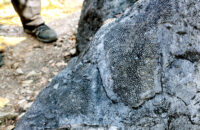 Fossils offer a glimpse into the past. Fossils are the remains or traces of organisms in a moment of time. The fossil record is the collective remains or imprints of preserved life forms that once lived on Earth.
Fossils offer a glimpse into the past. Fossils are the remains or traces of organisms in a moment of time. The fossil record is the collective remains or imprints of preserved life forms that once lived on Earth.
The term “fossil” originated from the Latin term fossilis meaning “obtained by digging.”
Fossils have played an essential role in the history of evolution, beginning with Xenophanes (570–480 BC), a Greek philosopher who found a fossilized sea creature in terrestrial sediments.
Fossilization
Fossilization is the preservation process of a life-form the remains or traces of organisms. The organism must be quickly buried for protection from scavengers and weathering in an anaerobic environment to stop microbes from breaking it down, yet survive for the first few minutes. .
For fossilization, the life-form must be buried by mud, sand, or rock sediments for protection from scavengers and weathering. Small mineral particles from the sediment eventually seep into the pores to harden into a stone-like copy.
The field of science that studies fossils is paleontology, a historical science like archaeology, geology, astronomy, and cosmology.
Geology
Life forms develop into fossils after being encased by flowing sand or mud sediments pushed by waters from oceans, seas, lakes, rivers, or floods. Since fossils are in sedimentary rock, geologists played an early role in studying the fossil record.
Geology and the fossil record show that the Earth and its life forms were once very different. Beginning with the Scientific Revolution, naturalists were increasingly drawn to study geology and the fossil record to understand why.
An emerging interest in geology eventually led to the organizing of geologic societies and establishment of natural history museums in the first half of the nineteenth century.
The first scientific paper published by Charles Darwin was on geology. Just months after returning on the HMS Beagle, his paper described the geology of the Chilean coast to the Geological Society of London.
Charles Darwin
The fossil record, however, was a problem for Darwin. In the Origin of Species, while frequently mentioning “fossils” and occasionally mentioning “paleontology,”
Darwin never used the phrase “fossil record.” He recognized that the fossil record, without transitional links, undermined his theory –
“Why, then is not every geological formation and every stratum full of such intermediate links? Geology assuredly does not reveal any such finely graduated organic chain; and this, perhaps, is the most obvious and serious objection which can be urged against my theory.”
In the words of American evolution paleontologist Stephen J Gould in “The Panda’s Thumb” –
“The fossil record caused Darwin more grief than joy.”
And Darwin explained why –
“We do not find infinitely numerous fine transitional forms closely joining them all together.”
Paleontology
Paleontology remains evolution’s most important field of study. The fossil record is the only direct evidence of Earth’s early biosphere and ecosphere.
The fossil record contains the prima facie history of life on early Earth. Significantly, the technological advances beginning in the twentieth century have revolutionized paleontology.
Scientists now have tools to examine and extract information once thought unthinkable, even in the early twentieth century.
Preserved soft tissues, cell structures, and even biomolecular information from the fossil record are now revealing a goldmine of ancient biological data. Interest in paleontology has reemerged to analyze the theory of evolution scientifically. Within paleontology are the new fields of paleobiology, sometimes called geobiology.
Paleobiology is answering questions about the scientific validity of molecular evolution and the evolutionary history of life through the analysis of DNA and RNA samples to construct phylogenetic trees.
However, evidence from the fossil record continues as one of the most profound paradoxes of the theory of evolution, a problem well known to Darwin, and paleontologists decade by decade. To study further how Darwin and evolution scientists have addressed the problem, click on “Fossils by the Decade”
The Fossil Record is a subcategory of Evolution and Science that scientifically explores the validity of the theory of evolution.
Scientific Validation
As a subcategory of Evolution and Science, evidence from the fossil record is essential for validating the theory of evolution scientifically.
Testing Fossil Record Evidence
To understand how specific fossil record studies continue to challenge the theory of evolution, click to read from the following –
- Ancient DNA Stability
- Ancient Fungal Clues Examined
- Anomalocaris’s Compound Eye
- Archaeoraptor Matter
- Ardipithecus ramidus Saga
- Art of Radiometric Dating
- Daohugou Biota
- Dinosaur Soft Tissue on 60 Minutes
- Dinosaurs Found in Unexpected Places
- Dating of Karabo, A Surprise
- Australopithecus Sediba Saga
- Evolution, Not What They Once Said
- Exploring Human Evolution via DNA
- Fossilized Mating Turtles
- Hominin Locomotion
- Human Evolution Orthodoxy
- Human Georgian Skull Fuels Dilemma
- Ida Fossil Fiasco
- Out-of-Asia Dilemma
- Reptile Embryos
- Smithsonian Evolution Storytelling
- Smithsonian Human Evolution Exhibit
Each article describes what evidence was found and why it scientifically draws into question the validity of the theory of evolution, using the reporters own words.
Darwin Then and Now is an educational resource on the intersection of evolution and science and the challenges facing the theory of evolution.
Refer to the Glossary for the definition of terms.

